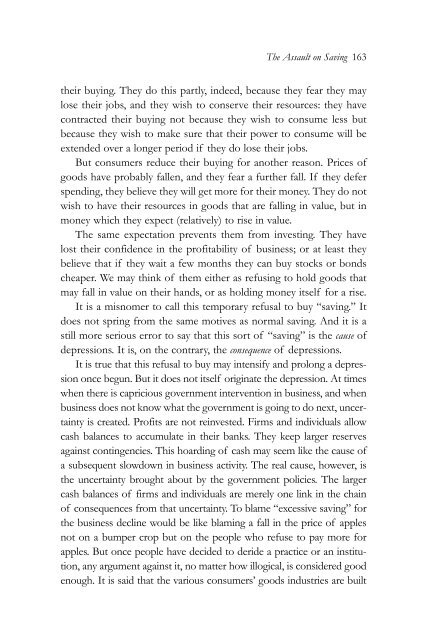1gDdM7w
1gDdM7w
1gDdM7w
- No tags were found...
Create successful ePaper yourself
Turn your PDF publications into a flip-book with our unique Google optimized e-Paper software.
The Assault on Saving 163their buying. They do this partly, indeed, because they fear they maylose their jobs, and they wish to conserve their resources: they havecontracted their buying not because they wish to consume less butbecause they wish to make sure that their power to consume will beextended over a longer period if they do lose their jobs.But consumers reduce their buying for another reason. Prices ofgoods have probably fallen, and they fear a further fall. If they deferspending, they believe they will get more for their money. They do notwish to have their resources in goods that are falling in value, but inmoney which they expect (relatively) to rise in value.The same expectation prevents them from investing. They havelost their confidence in the profitability of business; or at least theybelieve that if they wait a few months they can buy stocks or bondscheaper. We may think of them either as refusing to hold goods thatmay fall in value on their hands, or as holding money itself for a rise.It is a misnomer to call this temporary refusal to buy “saving.” Itdoes not spring from the same motives as normal saving. And it is astill more serious error to say that this sort of “saving” is the cause ofdepressions. It is, on the contrary, the consequence of depressions.It is true that this refusal to buy may intensify and prolong a depressiononce begun. But it does not itself originate the depression. At timeswhen there is capricious government intervention in business, and whenbusiness does not know what the government is going to do next, uncertaintyis created. Profits are not reinvested. Firms and individuals allowcash balances to accumulate in their banks. They keep larger reservesagainst contingencies. This hoarding of cash may seem like the cause ofa subsequent slowdown in business activity. The real cause, however, isthe uncertainty brought about by the government policies. The largercash balances of firms and individuals are merely one link in the chainof consequences from that uncertainty. To blame “excessive saving” forthe business decline would be like blaming a fall in the price of applesnot on a bumper crop but on the people who refuse to pay more forapples. But once people have decided to deride a practice or an institution,any argument against it, no matter how illogical, is considered goodenough. It is said that the various consumers’ goods industries are built


